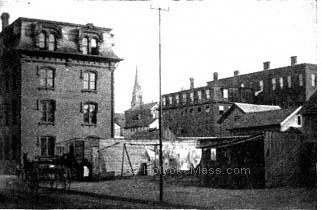
A Lyman Street Corner.
|
If following this road northward, one comes across the borders of Holyoke again at the village of Springdale, where, under the high sand bluffs along the west, is quite a well-grown hamlet. Elmwood is on the height above, and some of its houses are on the very edge of the declivity and loom up oddly in bare outline against the sky.
The mills of the city are now within sight, across a little meadow with a bordering of fine elms on its other edge. For miles along the canals is one great brick mill after another, each with one or more towering chimneys. The level below is filled with the crowding tenements of the help. It is a region in the main barren of trees, save where one of two little parks occupy the angles at a meeting of the streets. The district is densely populated. In fact, there is enough tenement life in Holyoke to bring the average number of persons in each house up to over eleven the city through, a number which few cities in the whole country exceed. It is to be hoped that as time goes on, cottage life will become more general.
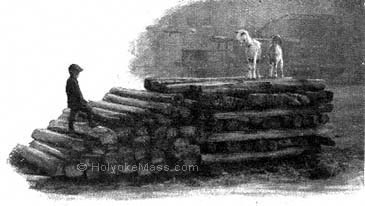
The Family Goats.
|
As a rule, workers in the mills spend, day by day or week by week, the full amount of their incomes. There are the thrifty exceptions, who start accounts with the savings banks and little by little win a growing competence and independence; but these are comparatively few. Often there are so many in the family dependent on the workers, as to make any saving next to impossible; again, the wages received are so low as to keep the family all the time on the verge of want. But lack of thrift—and by thrift I mean habits which bring a saving above expenses—can be traced, in not a few cases, to lack of brains or lack of forethought. There is about humanity a great deal of the grasshopper of the old fable. He has a gay time while summer lasts. He eats and drinks, and follows every pleasure that chances to attract him; but when winter comes, with its cold and hunger, he goes begging to the door of the thriftier ant.
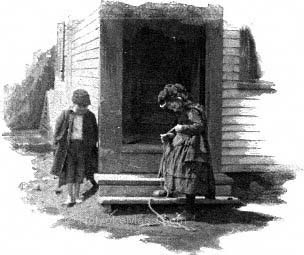
A Bashful Couple.
|
Those workers who have saved a little ahead, are able to tide over a spell of slack work or a season of illness. When work fails or sickness invades a family, it is a serious matter, even among the more thrifty; but with those who spend each week all their income, suffering, unless outside aid is prompt, is inevitable. It is an important matter that such families shall receive at such times friendly help. But the assistance must be judicious or it works harm. City aid brings with it a certain loss of self-respect.. Independence is impaired, and there is less personal effort afterwards and a readiness to go begging to the city when necessity does not compel. If self-respect is gone and begging, either of the city of or individuals seems to pay, then there is danger that the family will not take up work again, but will become chronic paupers. For the purpose of giving this temporary help to those in need, the city has the use of the income of the Whiting Street fund, left for that purpose. In October of each year, $1,400 is at the disposal of the committee in charge. Each case of want is investigated, and food, clothing and fuel is provided to suit the need. No money payments are made. Wise expenditure of money entrusted to the needy is not to be depended on, and the effect is not good. All the clothing called for is readily found among the well-to-do of the city, so that food and fuel are chief items of expense. The $1,400 is exhausted before the winter is through; but where there is real want there is quick response, and there is no suffering because of lack of funds.
It may be added that in case of sickness, the mills where the worker was employed generally render some aid. How much the charity and its form depends on the character of the manager who dispenses it. This leads to the consideration of certain phases of the relation of employer to employed. The following story, though commonplace in its details, illustrates some points very well. A man went to one of the mills seeking work. He said: "I’ve been a drinking man and that’s the way I lost my place. I’ve been everywhere for a job and can’t get one. I have a family and I must have work or starve."
They employer called in the superintendent of a department. "Have you a vacancy this man can fill?" he asked.
The reply was "No." The employer sent for a second superintendent and repeated the same question to him, and received a like answer.
"Well," said he, "one of you two must find something for this man to do. He can’t find work, and he and his family must live. But, remember, just as soon as he gets drunk, turn him off."
The result was the man had a place once more; but the sequel is another unhappy story of weakness. In the course of time the man had to have his spree, and in consequence he was at once turned adrift. It is certain that while drinking habits may not often prevent a man from getting a place or prevent his keeping it, they do count against him.
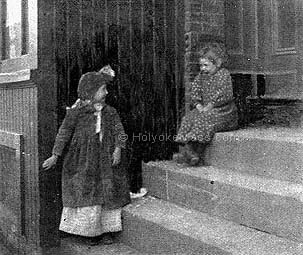
Doorstep Friends.
|
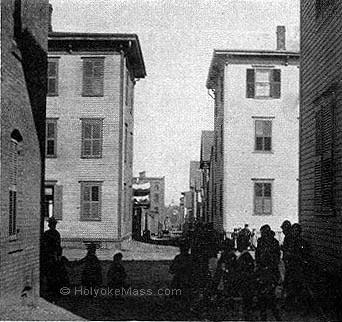
An Alley—Upper Dwight Street.
|
© Laurel O’Donnell 1996 - 2006, all rights reserved
This document may be downloaded for personal non-commercial use only
and may not be reproduced or distributed without permission in any format.
This is an edited adaptation from the original publication.
|